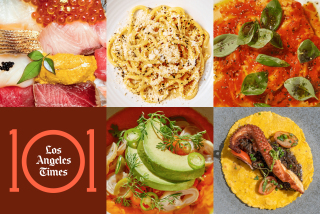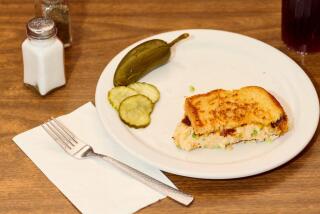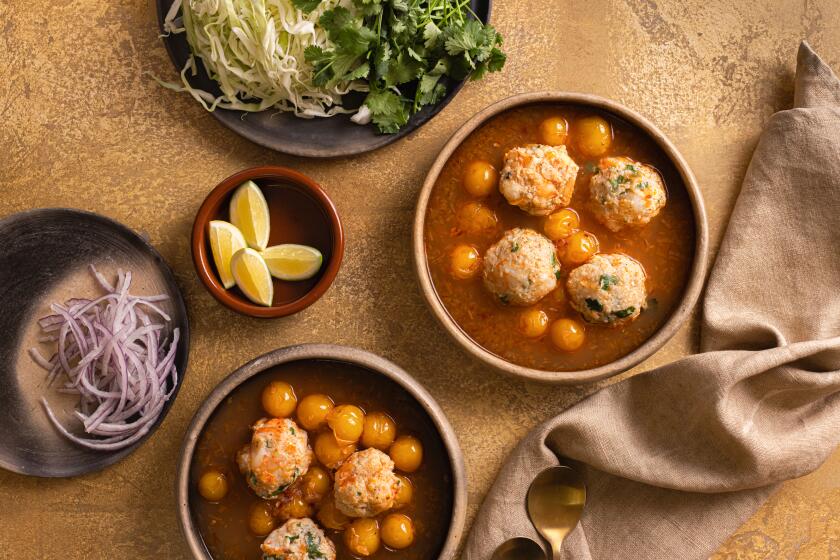Chinese Commercialism Sends Mooncake Prices Into Orbit
China has gone mad over mooncakes.
The humble seasonal pastries -- dense round cakes fried in pork fat and filled with lotus seeds or red beans -- are this country’s answer to the 5-pound fruitcake that gets passed around as the unwanted Christmas present.
But under the influence of Western-style commercialism, mooncakes have gotten a make-over. Through advertising, slick packaging and a stunning array of new flavors, the traditional holiday dessert has been transformed into a modern-day status symbol.
And now the Chinese, to whom gift giving is a serious exercise in social etiquette, find themselves locked in a virtual mooncake arms race as they do their last-minute shopping for the pastries to give to friends, families and colleagues in time for tonight’s annual moon festival dinner.
“It’s natural if you think about it,” Liu Yushun, 48, a Beijing construction foreman, said recently as he walked out of a local sweet shop with five bags of mooncake gift packages.
“Sellers are trying to promote their products if it is the right season or festival, and buyers need to keep up with what people’s counterparts are doing,” he said. “If other people are giving this to their work leaders, you have to do the same. They don’t want to be left behind.”
Bakeries, restaurants and high-class hotels are feeding the frenzy by cranking out mooncakes with increasingly exotic fillings -- shark fin, mussels, crushed eggshells, salted beef soaked in liquor, abalone, even bits of swallows’ nests.
There are sugar-free mooncakes, whole-grain mooncakes and Atkins diet mooncakes. There are Dove bar mooncakes and Haagen-Dazs mooncakes. For the metallurgically inclined, there’s even the ornamental 9.5-gram mooncake made of gold, costing $225.
And that’s only the half of it. Mooncakes now come packaged in individual boxes of carved jade or hand-polished wood. They are paired with expensive wines, fine porcelain tea sets, CDs -- even cameras -- in sets fetching as much as $1,210.
At the center of all the fuss is a lowly pastry that, by most culinary and nutritional standards, is no crowd pleaser.
In fact, the hockey-puck-shaped hunks of dough, sometimes stuffed with jujube jelly or salted duck egg yolks, are considered something of an inside cultural joke. Since most people can only tolerate them in small doses, they usually end up giving them away.
“Mooncakes are a cultural phenomenon that is akin to mincemeat pie,” said James Zimmerman, a corporate attorney from San Diego who has lived in Beijing for six years. “They are too heavy, too sweet, too greasy and something that you can pass on to the next guy if you get too many as gifts.”
Yet mooncakes have survived emperors, regimes and the invention of refrigeration to emerge as the traditional dessert served at family reunions marking the annual mid-autumn festival celebrated under the harvest moon.
The cake’s round shape represents family unity, and the dessert has earned a place at the table for its historical significance as well. Legend has it that Han Chinese stuffed secret messages in mooncakes to coordinate the overthrow of the Yuan Dynasty in the 14th century.
About the only strong emotion associated with mooncakes these days, however, is sticker shock.
A recent commentary in the China Daily, the state-controlled English-language newspaper, railed against the advent of high-priced mooncake gift boxes as a “half-baked idea” that allowed the rich to flaunt their wealth and unscrupulous public officials to accept thinly veiled bribes. It also accused mooncake manufacturers of using hype to exploit the cultural need to save face when giving gifts.
Even some who are profiting from the mooncake boom seem squeamish about what has happened to the cultural symbol, which costs about 5% more this year.
A leading executive at Beijing Dao Xiang Cun Foodstuffs Group, which expects to sell a record $14.6 million worth of mooncakes by tonight, agreed that the pastries had become “very commercialized.”
Bi Guocai, general manager at a Beijing bakery chain, said: “I, myself, am against this way of selling mooncakes. Mooncakes are a symbol. They bring people together. Now it’s not a simple product anymore. It’s a luxury product. So it’s a big waste. Mooncakes have lost their functions and symbolism.”
Browsing one mooncake store display last week, Li Weilan, 69, spied a fast-selling gift set that, at $60.70, featured six cakes shaped like a large fish and a fancy porcelain tea decanter. That comes to $27.60 per pound of cake, compared with the 4 cents per pound Li remembered paying as a girl.
“Back then, people didn’t have much money and mooncakes were quite simple,” she said.
Which is exactly the point, said Gao Bingzhong, a Peking University professor and general secretary of the China Folklore Society.
Gao maintained that the higher prices and slick packaging have mirrored China’s economic expansion. He noted that the mooncake craze first hit the country’s southern coast, then worked north to Beijing about six years ago -- following the path of prosperity and disposable income.
As salaries increase, people are willing to spend more on a gift that reflects their cultural roots.
“We are seeing the renaissance of Chinese folk culture,” Gao said. “You can say, in a way, it represents the new development of tradition.”
And if this year is any indication, there’s no end in sight for mooncake mania.
In Shanghai alone, 250 factories have been pumping out the pastries this summer, 50 more plants than last year.
And at Dao Xiang Cun in Beijing, 40 varieties are produced, with more likely to come.
“The traditional mooncake has characteristics that we call the three highs,” said Bi, the bakery manager, recalling the well-known phrase “three ups and downs” used to describe late President Deng Xiaoping’s roller-coaster career. The formula for mooncakes: “High in sugar. High in fat. High in energy.”
“We need to change the three highs to the three lows,” he said. “But meanwhile, we have to guarantee the taste wouldn’t change.”
Bu Yang and Yin Lijin in The Times’ Beijing Bureau contributed to this report.
More to Read
Eat your way across L.A.
Get our weekly Tasting Notes newsletter for reviews, news and more.
You may occasionally receive promotional content from the Los Angeles Times.






